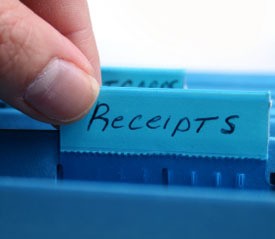It is not a coincidence that the word "taxing" and the forms we file each April have the same root word. For me the concept of filing taxes would be impossible without a computer program that does the work for me. What isn't difficult is tallying and organizing my deductions. I pride myself on finding every penny that I can deduct, and I do it with the help of a few simply office supplies that organize my receipts all year long.
Keep a multi-sectional expanding file on your desk throughout the year. Label each section with areas of papers you may need to file at tax time. Create sections for your flexible spending account, receipts for work deductions, receipts for charitable donations, receipts for miscellaneous deductions, check stubs, etc. At the end of the tax year it's much easier to total these receipts. Then, simply store the entire folder in your filing cabinet.
As a teacher I purchase various deductible items throughout the year. I simply circle the item on the store receipt and place it in the section I have for teaching deductions. At the end of the year, I tally my numbers and write the total on the tab for that section. Taxes don't require me to itemize.
Similarly, I have a section for charitable donations. These are anything but significant. They're the stubs from my yearly fire company donation, my ambulance subscription, a copy of the $10 check I donated to our animal shelter, and a receipt for dropping off two bags of used clothing at the local Good Will. I would never remember these donations come tax time, but with my folder I have a small claim to file.
Do you earn money with a side business? If so, a mileage log is essential. Even if you travel for your employer and receive reimbursement, a travel log is a great asset. They're inexpensive, and I get at least two year's worth from one log (I ignore the pre-labeled months and use one page for multiple months.) Simply log in the starting mileage of your vehicle for the year and then each time you take a trip log the mileage and the date. It helps to tally miles at the end of the year, and it offers a record should your mileage be questioned. For me, it is most valuable because it reminds me to log miles that I otherwise would forget to deduct. Do you have a small on-line business in which you sell items? Log in trips to the post office or office supply store. Did you drive to the printer's for business cards? Count your miles. By the way, the mileage log itself is a deductible expense.
You don't have to purchase the large desk calendar that could cover a wall. A small monthly calendar that you received for free will work. Each day record any expenses which could be tax deductible. Doctor's appointment? Write the doctor's name and the cost; it's a medical expense which could add up to a deduction. College tuition due? Write it down to tally for educational claims. Shopping trip? Write how much you spent for those scrubs for work. If you're very organized, try to color code your expenses for easy January tallying.
Remember that now is the time to organize next year's taxes. Don't dread the job of preparing your forms; instead keep them organized all year and enjoy the rewards and refunds.

Add your voice! Click below to comment. ThriftyFun is powered by your wisdom!
Hi -- I already use the steps you've detailed, and I've got another one to suggest. In the pocket calendar that I use to keep track of deductible expenses, I have listed the miles from my house to the various doctors and healthcare facilities I use, so now I can include the deductible miles for my mammogram and my labwork and my doctors' appointments and so on, which makes totaling them much easier!
A licensed tax consultant means that the person is a tax consultant and is licensed to perform as such. The only tax-specific license I am aware of is the EA (Enrolled Agent). To become an enrolled agent, you have to sit for, and pass a multi-part, 2-day exam administered by the IRS.
Add your voice! Click below to comment. ThriftyFun is powered by your wisdom!